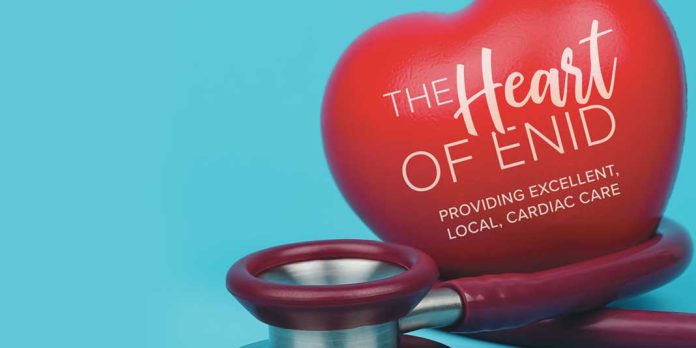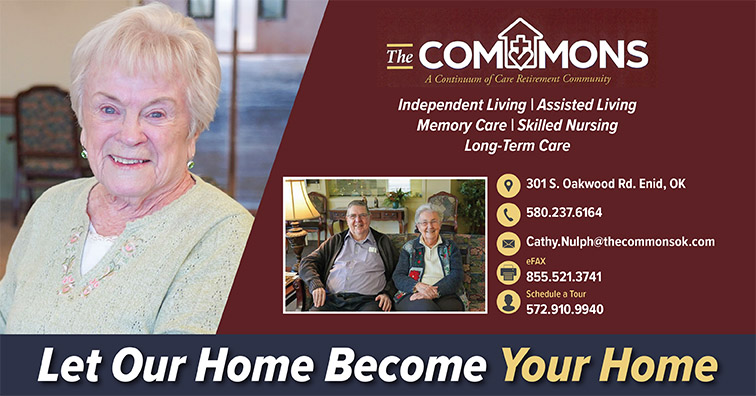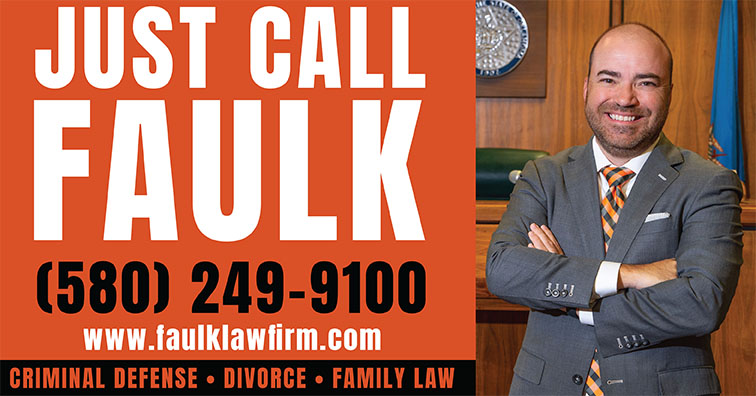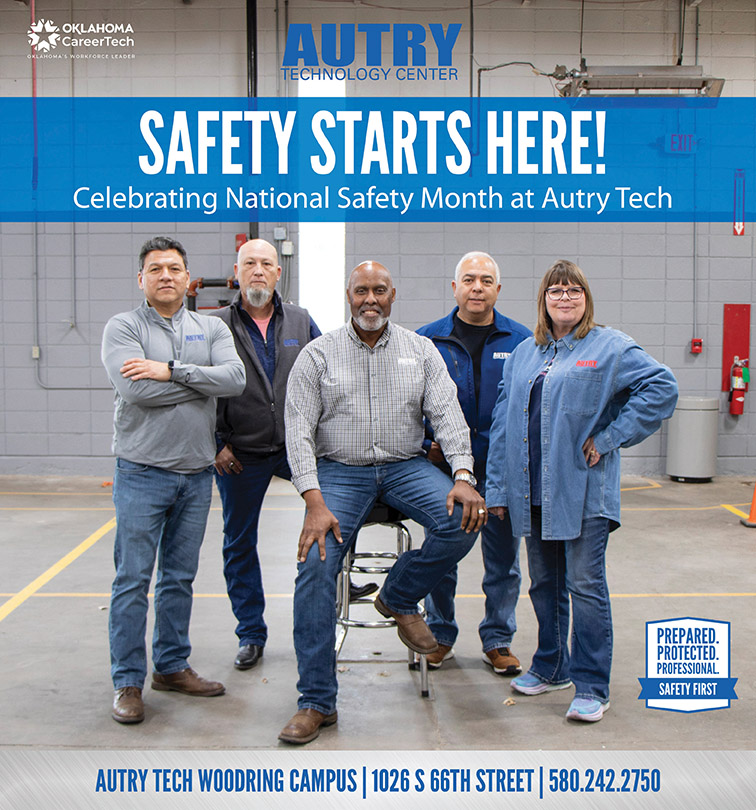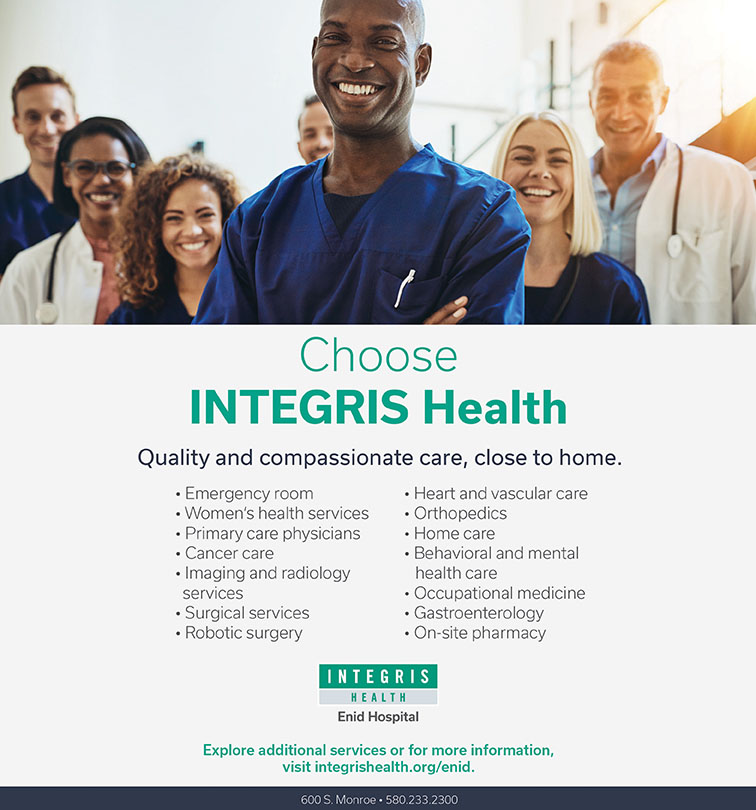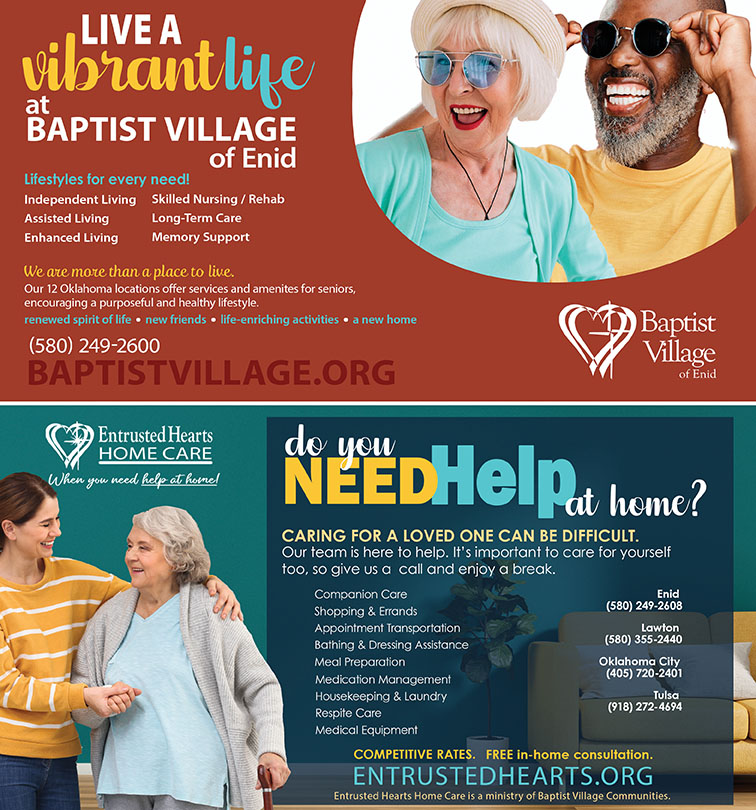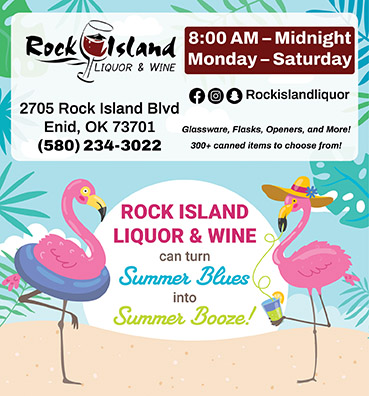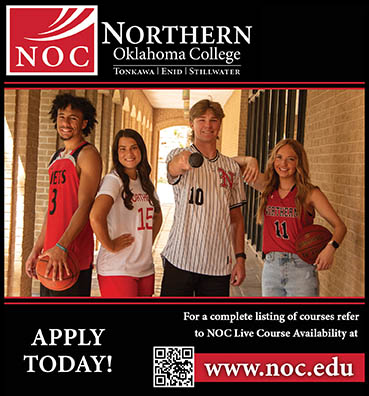By: Kaci Carpenter and Robert Faulk
When most people think of February, several things come to mind – candy, flowers and especially hearts. As a nod to Valentine’s Day (and because it is American Heart Month) we thought we would highlight a few of the amazing medical professionals and programs who have devoted their lives to keeping our hearts healthy. Enid is home to two hospitals, and numerous doctors, surgeons and other medical professionals whose specialty is the true heart of Enid.
INTEGRIS Health Heart and Vascular Institute
Did you know Enid has a clinic designated just for heart patients? INTEGRIS Health Heart and Vascular Institute located at 707 S. Monroe St. has been a great addition to our city. This clinic offers a wide range of services, allowing community members to receive heart care close to home. INTEGRIS Health Heart Hospital has a long history of bringing cardiovascular health to the people, especially in rural towns. This group of 35 doctors travels to 40 different locations around the state providing comprehensive cardiac care, including right here in Enid. The clinic’s goal is to provide treatment in a timely fashion, so they are able to find the source of the problem early on and treat it quickly. Much of the time, interventional treatment reduces or even stops the need for more extensive procedures.
Ryan Norris, D.O.
Ryan Norris, D.O. attended Kansas State University before graduating with his doctorate at Kansas City University of Medicine. He then completed his cardiovascular disease residency and fellowship at Advocate Lutheran General Hospital in Park Ridge, Illinois. Norris specializes in invasive non-interventional cardiology, as well as lipidology (one who studies fatty substances called lipids in the blood). He just so happens to be one of the only lipidologists in the state.
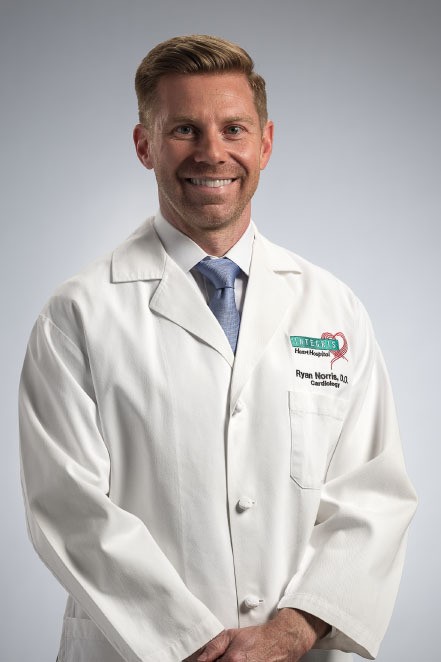
His interest in becoming a doctor, and specifically a cardiologist, stemmed from his maternal grandmother being ill with a lot of heart issues when Norris was a child. During his rotations in medical school, he realized his passion for cardiology. “It just clicked,” he said. I liked the ability to do procedures and treat people in emergent situations.” Now, after being a doctor for several years, Norris says the most rewarding part of his job is seeing people take control of their lives. “When I see someone who has completely changed their life, and has decided to do the right thing for their health, it gives me a lot of satisfaction.”
Dr. Norris was asked to come to Enid to be a part of the heart clinic, and he now works in Enid a couple of days each week. Norris enjoys Enid because it reminded him a lot of his hometown in Kansas. He said he really likes downtown and all of the architecture.
When asked if he could give everyone one piece of advice on heart health, he replied with no hesitation that following a Mediterranean diet would improve their health dramatically.
Douglas Brown, M.D.
Douglas Brown, M.D. has been a staple in the Enid community for 44 years and has seen a lot of medical transformations and innovations. Dr. Brown went to school at Indiana University and moved on to Indiana University School of Medicine. After graduation, he furthered his education at the University of Cincinnati and Baylor University Hospital in Dallas. Brown’s father was also a doctor and he knew he wanted to follow in his dad’s footsteps in this career choice. He was also inspired by his mentor, Charles Fisch, who was the founding director of Krannert Institute of Cardiology and director of the Indiana University School of Medicine’s cardiology division
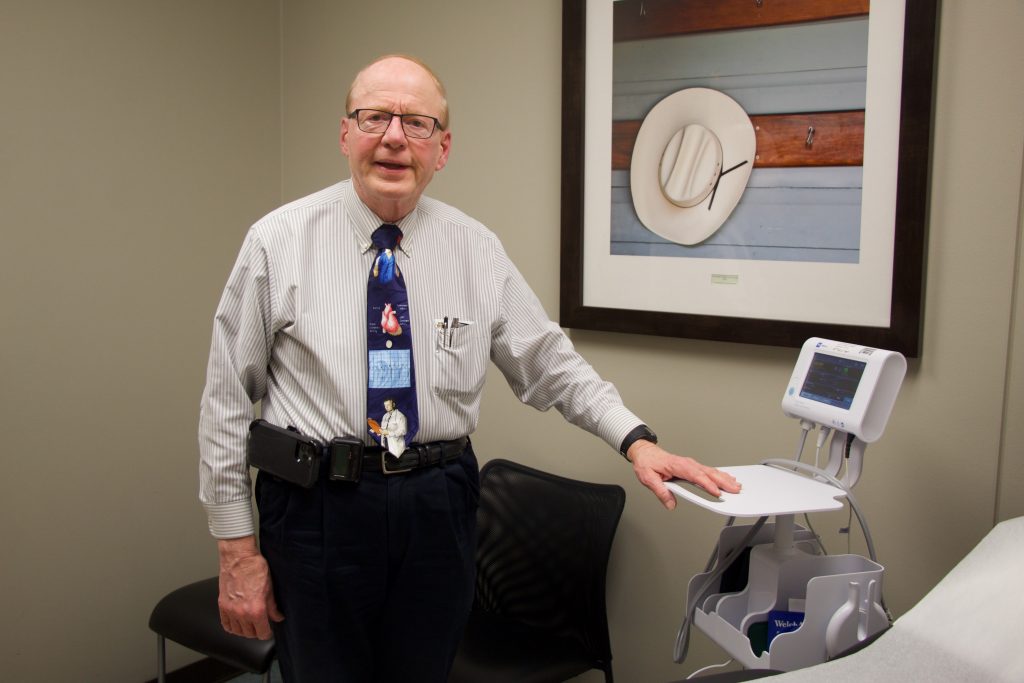
A general cardiologist, Brown specializes in interventional cardiology. His main goal is to fix the problem before it becomes an emergency situation. Placing stents and pacemakers are two primary ways he is able to intervene. Brown said, “It is so satisfying to reverse someone who is ill, taking them from death’s door to healthy in less than 90 minutes.” He learned interventional cardiology in his first five years in Enid and has been doing it ever since.
Brown was the first cardiologist to practice in Enid. After tiring of big city living, he wanted a good place to raise his two sons, and Enid offered him just that. Now, he practices full-time at the INTEGRIS Health Heart and Vascular Institute in Enid and is proud that the clinic is able to provide community treatment in such a timely fashion.
According to Brown, the best advice for a healthy heart is diet and regular exercise. “The average American consumes 50 percent of their calories in fat, and this number should stay between 20-25 percent,” Brown said. “Exercise tunes the heart, and the best way to do that is to work out three times a week between 20-45 minutes each session. Any more doesn’t do a whole lot, but at least this much would drastically improve outcomes. A good goal for walking is two miles in at least 34 minutes, in order to receive some cardio benefit.”
INTEGRIS Health Heart and Vascular Institute is supported by INTEGRIS Health Heart Hospital in Oklahoma City, bringing a variety of cardiology physicians to support the community of Enid, while also providing access to the latest cutting-edge heart interventions and surgical procedures in Oklahoma City. INTEGRIS Health Heart Hospital offers the state’s only heart transplant program.
For more information about INTEGRIS Health cardiac services, visit integrisok.com.
Mediterranean Diet
Interest in the diet began in the 1950s when it was noted that heart disease was not as common in Mediterranean countries as it was in the U.S. Since then, numerous studies have confirmed that the Mediterranean diet helps prevent heart disease and stroke.
The Mediterranean diet is a way of eating that’s based on the traditional cuisines of Greece, Italy and other countries that border the Mediterranean Sea. Plant-based foods, such as whole grains, vegetables, legumes, fruits, nuts, seeds, herbs and spices, are the foundation of the diet. Olive oil is the main source of added fat.
Fish, seafood, dairy and poultry are included in moderation. Red meat and sweets are eaten only occasionally.

Healthy fats instead of unhealthy ones
Olive oil is the primary source of added fat in the Mediterranean diet. Olive oil provides monounsaturated fat, which lowers total cholesterol and low-density lipoprotein (or “bad”) cholesterol levels. Nuts and seeds also contain monounsaturated fat.
Fatty fish, such as mackerel, herring, sardines, albacore tuna and salmon, are rich in omega-3 fatty acids. These polyunsaturated fats help fight inflammation in the body.
Omega-3 fatty acids also help decrease triglycerides, reduce blood clotting, and lower the risk of stroke and heart failure.
What about wine?
Wine is often associated with the Mediterranean diet. It can be included but only in moderation. While alcohol may reduce the risk of heart disease, it has other health risks.
The Mediterranean way
Interested in trying the Mediterranean diet? Get started with these tips:
- Build meals around vegetables, beans and whole grains.
- Eat fish at least twice a week.
- Use olive oil instead of butter in preparing food.
- Serve fresh fruit for dessert.
(Information about the Mediterranean Diet from mayoclinic.org)
St. Mary’s Regional Medical Center Tips to Be Heart Smart
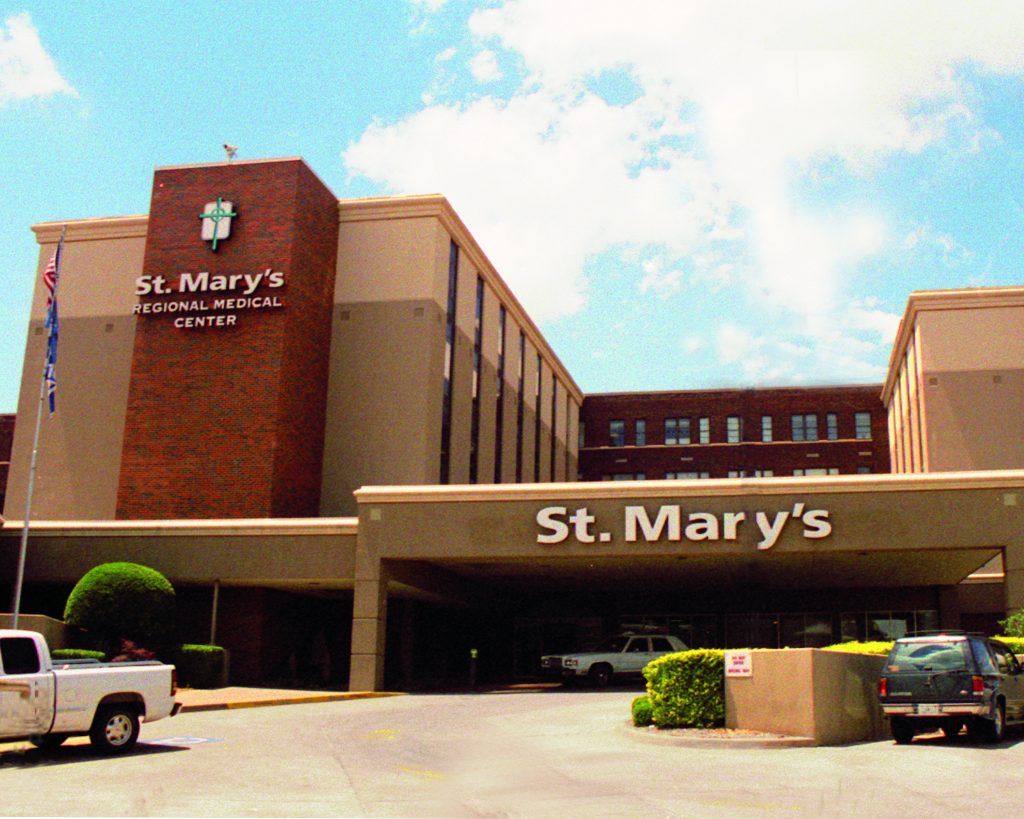
Your heart is a critical organ – the rest of your body depends on it. It is at the center of your cardiovascular system and is responsible for pumping blood around the body to send oxygen and nutrients where they are needed and to carry away unwanted waste products.
“Understanding the health of your heart is important because heart disease is the No. 1 cause of death in the United States, according to the American Heart Association®,” said Lior Shamai, DO, a cardiologist with St. Mary’s Regional Medical Center. “The heart is the organ that keeps your body running. Recognizing that can inspire you to keep it healthy.”
The cardiovascular team at St. Mary’s Regional Medical Center is here to help, from prevention and education, to diagnosis, treatment and rehabilitation. We offer award-winning, comprehensive services to help get, and keep, your heart health on track.
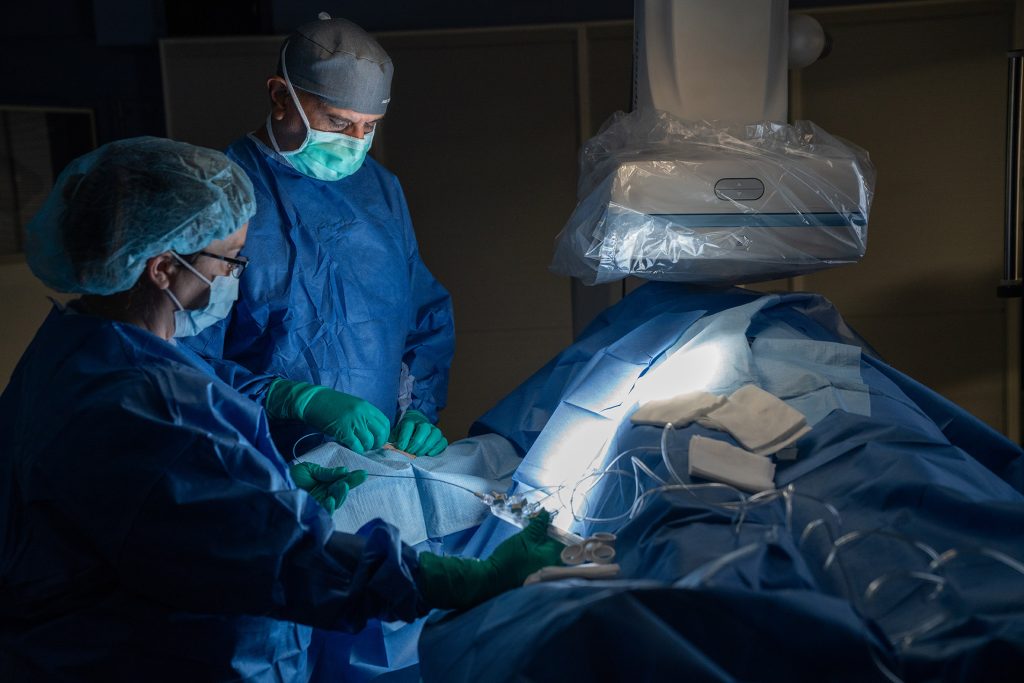
Is Heart Disease Hereditary?
“If you have a family history of heart disease, you may be at higher risk for having heart issues,” said Dr. Shamai. “Many different types of heart disease can be passed down through families. Some are caused by just one or a few genetic changes that have a very strong effect in causing disease.”
Known as monogenic conditions, they include uncommon disorders that mostly affect the heart’s muscle (such as hypertrophic cardiomyopathy) or electrical system (such as long QT syndrome). Another example is familial hypercholesterolemia, which causes very high cholesterol levels and may lead to premature coronary artery disease (occurring before age 50).
In addition, you can have an elevated risk for cardiovascular disease if you have family members with diabetes, high blood pressure or high cholesterol, which can have genetic predispositions. Still, family history is just one component of your overall risk for developing cardiovascular disease.
Heart Attack Awareness: What You May Not Know
When you think about cardiac care, a heart attack may be the first thing to come to mind. The Centers for Disease Control and Prevention (CDC) reports that, on average, an American adult has a heart attack every 40 seconds.
“One mistake people make is delaying medical treatment when they experience potential heart attack symptoms,” noted Dr. Shamai. “Most heart attack symptoms start slow and mild. It’s important to understand that men and women may experience different symptoms.”
Men often (but not always) experience what are known as “classic” signs of a heart attack:
- Discomfort in the center of the chest that feels like pressure, squeezing or fullness that goes away, then returns
- Chest discomfort along with fainting, lightheadedness, shortness of breath or nausea
- Pain that spreads to the neck, shoulders or arms
Women may experience milder forms of the “classic” symptoms, as well as:
• Shortness of breath/difficulty breathing
• Back or jaw pain
• Nausea, vomiting or dizziness
• Palpitations, paleness or cold sweats
• Mild, flu-like symptoms
• Unexplained anxiety, fatigue or weakness
How Do I Know if I Am at Risk for Heart Disease?
Ask your doctor about cardiovascular health screening tests. The most important indicators for cardiovascular health are blood pressure, cholesterol and blood sugar levels. High blood pressure may indicate that your heart is working too hard to pump blood to your body, potentially damaging your blood vessels. High blood sugar can also contribute to damage to blood vessels. Meanwhile, high cholesterol indicates a risk of fatty deposits in your arteries, which can lead to blockages.
Smoking, family history and body weight are also indicators for cardiovascular disease. Talk to your doctor to help monitor and manage these risk factors.
If you want more information on your specific risk, you can start the calculation using the online 10-year risk calculator from the American Heart Association®, at https://www.cvriskcalculator.com.
Advanced Heart Attack Care
St. Mary’s Regional Medical Center is consistently a top performer in providing patients who suffered a heart attack outstanding door-to-balloon (D2B) time. D2B time refers to the interval from the time a patient arrives at the hospital’s door to the inflation of a balloon catheter within his or her blocked artery in the catheterization (cath) lab to restore blood flow (percutaneous coronary intervention or PCI). The shorter the D2B time, the greater the chance of survival.
The cardiac care teams offer advanced diagnostic testing, noninvasive and invasive treatments, cardiac rehabilitation and preventive education about congestive heart failure, pulmonary hypertension and peripheral vascular disease.
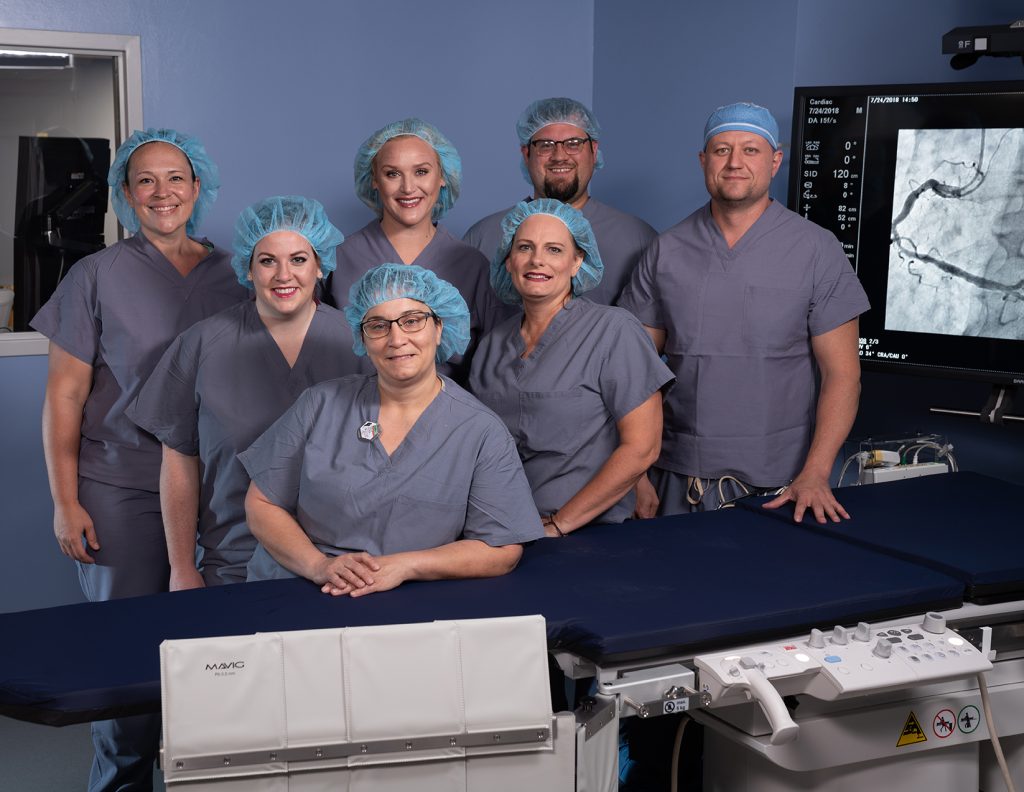
After a Heart Attack, What’s Next?
People can live long, productive lives after a heart attack, but it’s important to lower the likelihood of future heart problems or related death. The Change of Heart Cardiac Rehabilitation Program at St. Mary’s offers a patient-centered program that emphasizes a personalized approach to recovery through exercise, education and encouragement.
The team of healthcare professionals includes cardiologists, registered nurses, exercise specialists and dietitians. And as many people who’ve participated in these programs can attest, it can help you feel better physically and emotionally and give you greater control over your health.
If you or a loved one experience signs of a possible heart attack, call 911 or get to the nearest emergency room.
February is American Heart Month. It’s a great time to focus on your cardiovascular health.
Learn more about cardiac services at St. Mary’s Regional Medical Center at https://www.stmarysregional.com/services/cardiology.
Source: American Heart Association®
Physicians are on the medical staff of St. Mary’s Regional Medical Center, but, with limited exceptions, are independent practitioners who are not employees or agents of St. Mary’s Regional Medical Center. The hospital shall not be liable for actions or treatments provided by physicians. For language assistance, disability accommodations and the nondiscrimination notice, visit our website.







